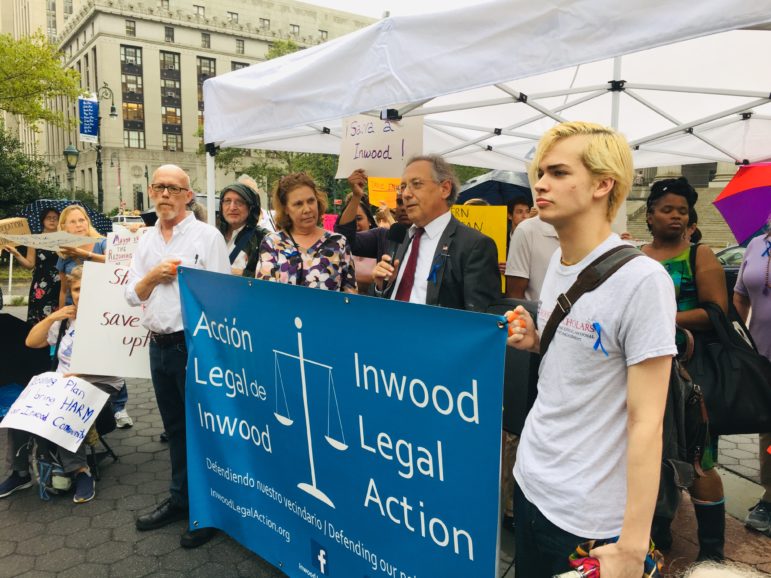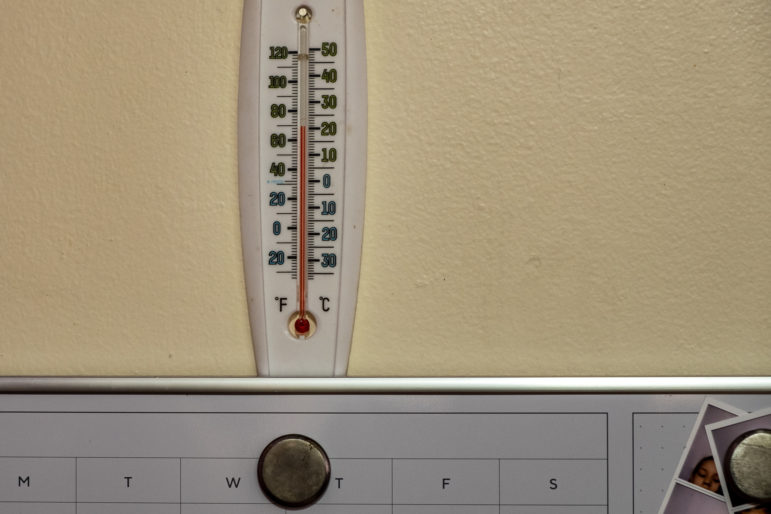
Sadef Kully
Community groups rallied outside civil court Tuesday, following oral arguments in a lawsuit challenging the city’s rezoning of Inwood.
A Manhattan Supreme Court judge is expected to issue a decision in the coming months in a lawsuit challenging the city’s rezoning of Inwood, after community groups and the de Blasio administration presented oral arguments in civil court Tuesday over the city’s plans for the Northern Manhattan neighborhood.
The lawsuit, filed by Inwood Legal Action and a coalition of community groups and residents, challenges the approval of the 2018 rezoning plan itself, and contends the process the city used to conduct it was incomplete. It’s being brought under Article 78, a state law that allows for legal challenges to the “actions of administrative agencies and other government bodies.” In this case, the suit argues the city’s environmental review process failed to examine how the rezoning would impact the socio-economic demographics of the Inwood community, including race, income and language.
“We are not here to debate if the upzoning is a proper upzoning or not,” said Michael Sussman, lead attorney for Inwood Legal Action. “This is an illegal upzoning.”
Sussman argued the city’s environmental impact study missed important factors, such as the impact the rezoning would have on preferential rent leases, racial displacement, and minority- and women-owned businesses. The lawsuit also alleges the study failed to take into account the impact of other prior city rezonings, and the effect of the temporary loss of Inwood’s library, which will be replaced under the plan with a mobile unit until construction of a new facility for it starts next year.
He also took issue with the fact that the city issued its statement of findings for the rezoning in October, after the plan was already approved by the City Council. Statement of findings are reports required from each agency involved in a rezoning on the impact a project will have on the environment, according to the City Environmental Quality Review (CEQR) website. In the end, Sussman asked the court to nullify the approval of the rezoning.
An attorney for the city, however, argued the rezoning plan—which includes a mix of commercial and residential uses, as well as affordable housing measures such as the city’s mandatory inclusionary housing program—addresses the housing needs of the Inwood community. The city asserts that its impact study was done under the guidelines of the technical manual, a city document that details the methodology used to guide the environmental review process. On the statement of findings, the city argued that CEQR findings can be completed before or after an action is enacted legislatively.
Justice Verna Saunders said Tuesday that arguments from both the city and community groups in the case were “key and critical” and that she would “thoroughly review all the arguments” before rendering a decision in the coming months.
“What the city said in court today was very simple: We don’t want to know the impact of this rezoning on people of color. We don’t want the world to know. We don’t want anybody to know. It’s not of any importance to us,” Sussman said at a press conference Tuesday after court. “Don’t interpret any differently what you heard, because that is what I heard.”
The Inwood rezoning was approved by the City Council last August, and is slated to bring residential and commercial development eastward across 10th Avenue to the Harlem River, while applying contextual zoning —to preserve neighborhood character—for several residential areas west of 10th Avenue. It also includes a plan to replace the Inwood library with a new building that will also include residences.
The estimated $500 million rezoning plan will facilitate 2,600 new affordable housing units and preserve and protect another 2,500 existing affordable homes, according to the city. The mandatory inclusionary housing (MIH) program for Inwood gives developers a choice between devoting 25 percent of units in new developments as affordable housing to households making 60 percent of the area median income (an estimated $56,340 for a household of three people) or setting aside 20 percent of units to be affordable to those making 40 percent of area median income, or $37,560 a year for a household of three.
But Inwood community groups, such as Northern Manhattan is Not for Sale, accuse city officials of having sold out the community, saying residents did not want the rezoning. Before the plan was approved, Inwood community members and organizations held several protests against it, including one incident where some protestors were arrested after taking over local Councilmember Ydanis Rodriguez’s office. Rodriguez, who spearheaded the rezoning, did not immediately respond to City Limits’ request for comment.
Inwood business owner and plaintiff Ivan Yeung, who has operated U Like Chinese Take Out on the corner of Broadway and 207th Street for 14 years, told City Limits he’s concerned about rising rent and the loss of business that might come from new development the rezoning is expected to bring to the area.
Other residents said that they were involved with the city’s community engagement workshops while the rezoning plans were underway, but feel like their suggestions fell in deaf years.
“I should have never cared to attend those workshops,” one resident said Tuesday.
Inwood is not alone. In the past year, community groups across the city have taken their fight against development and rezonings to the court or the City Council, including community groups fighting a large-scale development in Two Bridges and others pushing for a fair and equitable Bushwick rezoning. Organizers for both groups have raised concerns over the city’s method for the environmental review. Some members of those groups were also present in the courtroom Tuesday for arguments in the Inwood lawsuit.
“It is very, very important for all of us, not only Inwood, but also everyone that is considering to fight rezoning around our city. They’re all watching, and every time someone steps up and complains about a zoning, we’ll have demonstrations or go to court,” said State Sen. Robert Jackson, who represents Inwood. “It is important for folks to know that the people of Inwood are against the rezoning.”
The de Blasio administration remains adamant that in the long run, the rezoning will bring more affordable housing and much-needed improvements to the neighborhood, from upgrades at local schools to park revitalization projects.
“The City stands by the approvals it made authorizing this important initiative,” a spokesman for the city’s Law Department said in an email statement to City Limits. “We look forward to the Court’s review of the thorough record, which we strongly believe supports the City’s position in this litigation. We remain committed to delivering the investments this community needs, which includes the preservation and development of affordable homes, restoration and creation of waterfront parks, new jobs, educational resources and small business support.”
Coupled with the rezoning plan was an estimated $500 million in capital investments for Inwood, of which approximately $200 million are dedicated to funding various city projects and initiatives, according to the Inwood points of agreement with the city. The rezoning plan, a NYC Economic Development Corporation initiative, was an extension of the city’s wider action plan to revitalize waterfronts across the city.
“We’re making good on our promise to Inwood and are committed to delivering the investments this community needs, which includes the preservation and development of affordable homes, restoration and creation of waterfront parks, new jobs, educational and cultural resources, and small business support,” said an NYCEDC spokesperson.
Some of the neighborhood projects promised in the rezoning agreement have already been completed, including an estimated $400,000 reconstruction of the Dyckman Green Gym at Inwood Hill Park, as well as $65,000 in upgrades at Wallenberg Playground and the 175th Street Recreation Area, according to the NYCEDC.
Other projects are in the works. The $30 million construction on Highbridge Park, which includes upgrades to Adventure Playground and Sunken Playground, pathway lighting to the historic High Bridge, and a new synthetic turf practice field in the southern part of the park, has begun. The city will complete designs for renovations to Anne Loftus Playground this summer, and has started designs for the renovation of Monsignor Kett Playground on West 204th Street between Nagle and Tenth avenues, which will include basketball courts, a fitness area and new bathroom facilities. Both sites are getting more than $18 million in renovations. And the historical Highbridge Water Tower will start construction next month, which is expected to cost between $3-5 million.
The city will also release a request for expressions of interest in the coming months for arts and cultural organizations interested in operating the planned Immigrant Research and Performing Arts Center, one of local Councilmember Ydanis Rodriguez’s project ideas. The project will receive an estimated $15 million in capital funding, which includes $75,000 for capacity building training for selected arts and cultural organizations, and up to $75,000 per year in energy assistance for operating the facility.
Funding has been allocation for work-training and business-related initiatives as well, include training programs for things like entry-level web development, bilingual commercial driver’s licenses, a preparation course for internationally trained nurses and bilingual medical assistant training. The city’s Small Business Services continues to reach out to small businesses in Inwood, and provide support services including commercial lease assistance, financing, business education, and funding through the city’s Neighborhood 360 program, according to city officials
Another $500,000 has been allocated through the Inwood rezoning to support housing programs in the neighborhood, such as Partners in Preservation, which coordinates with community based groups on things like code enforcement, tenant organizing and education and legal representation for tenants. According to the EDC, the Tenant Support Unit conducted outreach to Inwood residents with information about anti-displacement resources, and has knocked on more than 30,000 doors, made over 14,000 calls, and assisted over 2,500 New Yorkers within zip code 10034.
Additionally, Services for the UnderServed, a nonprofit that offers homeless services, has opened an office in Washington Heights to assist residents of Northern Manhattan who are at risk of homelessness, according to the city.








3 thoughts on “Inwood Community Groups Head to Court in Lawsuit Challenging Neighborhood Rezoning”
Rodriguez, who spearheaded the rezoning…..
Ydanis Rodriguez is a 40 watt handpuppet. He couldn’t “spearhead” his way out of a paper bag. Keep an eye on him. Eventually we’ll know what he sold Inwood for.
Pingback: Inwood Seeing New City Programs and Developer Interest 1 Year After Rezoning – USA New Updates
Good afternoon I’m Estany Lantigua I need help with my student loan forgiving plan , because I have some issues with the school that attended before, need a lawyer consulting regarding this problem if the community have some lawyers help me to filled a application
347 596 3850